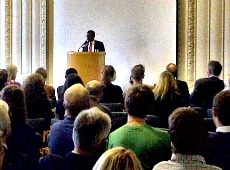Former President Mohamed Nasheed has issued a statement condemning the “appalling violence” of security forces in Wednesday’s crackdown on demonstrators backing the recently deposed Muslim Brotherhood.
“Dozens of protestors – reportedly including women, children and journalists – were killed on Wednesday as security forces opened fire on supporters of former President Morsi, who was ousted in a coup in July,” the statement read.
“Should these reports prove to be accurate, President Nasheed believes that the dispensation currently ruling Egypt should be held fully responsible for the protesters’ deaths.”
Egyptian state media reports suggested 235 civilians had been killed in the crackdown and 2000 injured after the Egyptian army opened fire on demonstators, while media present suggested the death toll could be much higher.
In a statement the International Press Institute suggested journalists were being deliberately targeted by both sides in the conflict. Journalists killed yesterday included a reporter from a state newspaper in the UAE Habiba Ahmed Abd Elaziz, Egyptian journalist Ahmed Abdel Gawad and a UK Sky News cameraman.
Egyptian prime minister Hazem El Beblawi declared a month-long state of emergency and evening curfew as violence began to erupt across the country, following the military’s bulldozing of the protest camps in Cairo.
According to Al Jazeera, Beblawi praised police for using “self-restraint” and accused protesters of “carrying illegal arms, hijacking roads, assaulting private and public property and crippling people’s interest”.
“It is an assault on the citizens and the authority of the state, which should be respected by all,” he said. “Therefore it was necessary to take a firm stance. It was necessary for the state to intervene to restore security and to assure citizens that their rights could not be undermined by the protests.”
His Vice-President Mohamed El-Baradei meanwhile resigned in protest against the violence, stating that there had been peaceful options for resolving the political turmoil.
The crackdown has been condemned by governments around the world, including the UK, EU, US and UN.
UN secretary general Ban Ki-moon urged for “inclusive reconciliation” while US Secretary of State John Kerry said the “path toward violence leads only to greater instability, economic disaster and suffering”.
“Today’s events are deplorable and run counter to Egyptian aspirations for democracy. We and others have urged the government to respect the rights of free expression and to resolve this peacefully,” Kerry said. “There will not be a solution from further polarisation.”
The Maldivian government has issued a statement urging “all parties to respect the right to freedom of assembly as stated in the Universal Declaration of Human Rights, the International Covenant on Civil and Political Rights, and the United Nations Human Rights Council Resolution 15/21 on the Rights to Freedom of peaceful assembly and of association.”
“As an emerging democracy itself, the Maldives is familiar with the trials of democracy consolidation. A full and resilient democracy and a culture of respect for human rights can only be cultivated through denouncing of violence, and collaboration and consultation between all stakeholders, including the political opposition,” said a statement from the Foreign Ministry.
The Maldives also experienced a police and military mutiny on 7 February 2012, which saw police arming opposition demonstrators and launching an assault on the Maldives National Defence Force (MNDF)’s main military base and forcefully taking over the state broadcaster. The protesters then issued an ultimatum to President Mohamed Nasheed, who was inside the base, calling for his resignation.
Nasheed complied, stating that remaining in power at that juncture “would require the use force which would harm many citizens.”
A subsequent and controversial report by a Commonwealth-backed Commission of National Inquiry dismissed claims that the security forces’ mutiny had “any coercive effect upon the President.”
“Indeed, until the time of his resignation, President Nasheed possessed of many powers under the Constitution that he could have utilised including the lawful use of force. He chose not to,” the report stated.
“That decision may be classified as praiseworthy, but he cannot now contend that because he made those choices, that he was ‘forced’ into resigning.”
Hotline
The Maldivian government has meanwhile opened a hotline (+960 779 4601) for the 84 Maldivian students and their families living in Egypt.
Egyptian protesters who were gathered near the Rabaa al-Adawiya mosque in east Cairo last night were dispersed by security forces gathering in Nasru City’s Masjidul Salaam mosque area, approximately 100 meters from where the Maldivian expatriates are living, State Foreign Minister Hassan Saeed told Minivan News.
“Earlier the demonstrations were quite far from the students, however the demonstrators have shifted to near the Masjidul Salaam mosque, which is one bus stop away, or about 100-150 meters, from where the students are located,” said Saeed.

